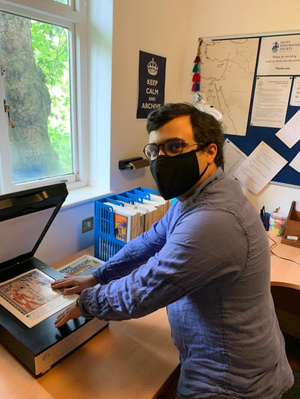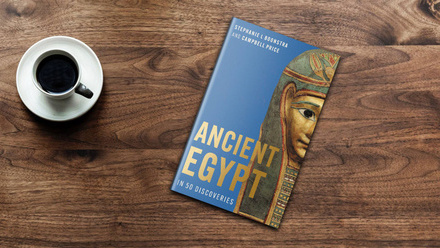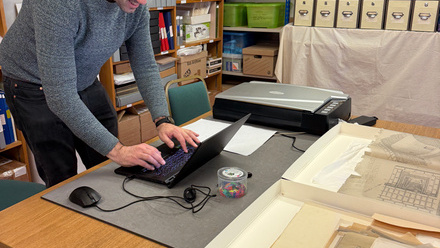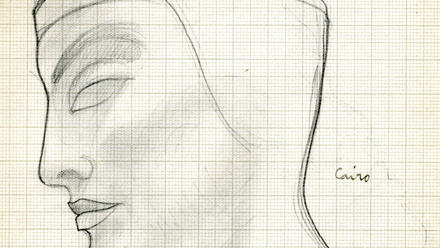Volunteering at the EES in 2023

Starting his volunteering journey at the EES in February 2020 (little did we know about the impending pandemic), Guilherme Borges Pires has single-handedly scanned over 1400 items in the Society’s Special Collections and archive – first by scanning the Society’s copies of 1920s-70s Egypt and Sudan travel magazines and then moving on to a series of object cards from the Society’s excavations at Amarna in the 1920s.
Here he talks a little about his time at the EES and what the future holds.
After over 3 years of volunteering (although with a hiatus in the beginning due to the pandemic), you have now completed two volunteering tasks for the EES Special Collections and archive, respectively. How do you think these projects have helped you going forward in your career?
Volunteering at the EES enabled me to expand my skills and knowledge as an historian and Egyptologist. This was my first experience working with archive material, including scanning items and sorting digitised files. Scanning the covers and analysing the contents and contributors of the historic travel magazines allowed me to learn more about modern Egypt and its tourism, as well as the history of Egyptology, its colonial legacies, and the various ways Egypt has been (re)imagined over the last 100 years. Going forward, I feel better equipped to work in/with archives and more cognisant of Egyptology’s multi-layered history.
You wrote an article for the latest issue of Egyptian Archaeology as well as a Collection Highlight for the EES website on your work with the Egypt and Sudan historical travel magazines in the Special Collections. How was the research and writing process for these?
From the first scans, the multiple perspectives the material can be approached from became evident. More importantly, acknowledging Egyptians who actively contributed to these magazines was a priority. Thus, while scanning the magazines’ covers and content pages, I listed the iconographical motifs depicted on each cover, inventoried the names of every individual involved in these magazines, and grouped the different articles into thematic categories (which are now in lists accessible online). When I finished writing the Collection Highlight the text was much longer than it was supposed to be, so it was a delight to turn that into a piece for EA and lift the veil on a few topics. But there is still a lot more to unpack!
What have you liked the most about joining the EES team?
I have really enjoyed it all! Volunteering in such a beautiful premises, learning more on modern Egypt, and digging into Amarna's object cards were all an absolute joy! Moreover, as the EES is a beacon of Egyptological research, several students and scholars visit the London office, so not only did I get to expand my Egyptological network, I also bumped into friends and colleagues, sometimes unexpectedly!
… and least?
Having to stop volunteering due to the COVID-19 outbreak, and waiting a year to resume it was quite unfortunate. Oh, and sometimes the scanner was a bit slow!
What is your PhD research about?
My PhD explores the concepts of “creator” and “creation” in the religious hymns of the New Kingdom. I navigate through three core questions: 1) Who creates?; 2) What is created?; and 3) How is it created?. As a part of my PhD (at Universidade NOVA de Lisboa in Portugal), I have been translating the texts I am researching into Portuguese as there is a notable lack of direct translations from ancient Egyptian to Portuguese, which I hope to help address.
What’s next for you?
After finishing my PhD, I plan to continue researching the multifaceted nature of the Egyptian creator deity. I also intend to make Portuguese-speaking Egyptology better known, while helping disseminate knowledge on ancient Egypt to Portuguese-speaking audiences. Together with colleagues, I am editing a volume on Lusophone (Portuguese-speaking) Egyptology and creating a podcast about ancient Egypt/Egyptology in Portuguese.
I want to help advance Egyptology and interest in ancient Egypt among wider audiences – particularly amongst Portuguese speakers.
Guilherme Borges Pires’ article ‘Scanning the Past: Travel Magazines in the EES Special Collections’ is in Egyptian Archaeology Issue 62 (Spring 2023), which should be arriving with EES members from late March 2023 onwards.



